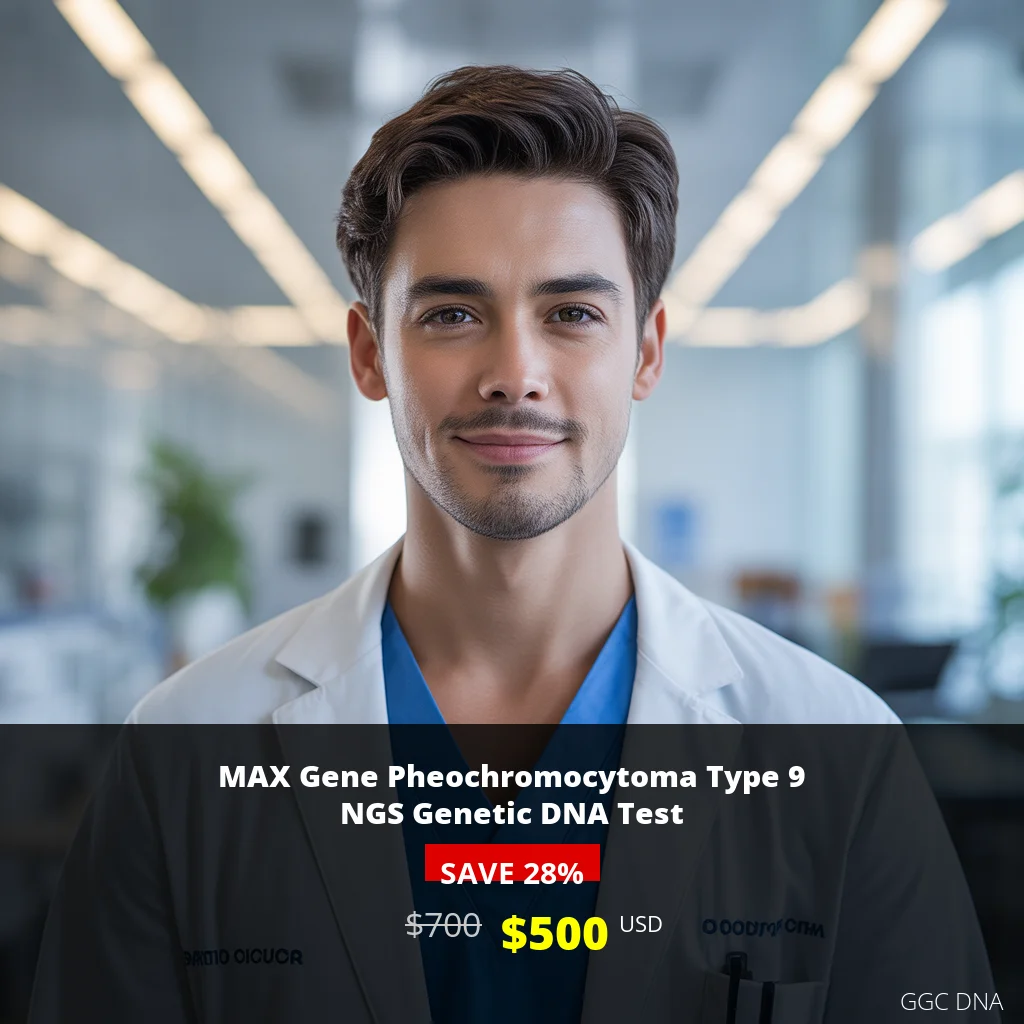MAX Gene Pheochromocytoma Type 9 NGS Genetic DNA Test
Comprehensive Genetic Testing for Hereditary Cancer Risk
The MAX Gene Pheochromocytoma Type 9 NGS Genetic DNA Test represents a breakthrough in precision medicine for individuals concerned about hereditary cancer syndromes. This advanced diagnostic tool utilizes next-generation sequencing technology to analyze the MAX gene, which plays a critical role in regulating cell growth and division. Mutations in the MAX gene are strongly associated with familial pheochromocytoma and paraganglioma syndromes, rare neuroendocrine tumors that can have significant health implications if undetected.
What This Test Measures and Detects
Our comprehensive NGS-based test specifically targets the MAX gene, examining its complete coding sequence and critical regulatory regions to identify:
- Pathogenic variants and mutations in the MAX gene
- Single nucleotide polymorphisms associated with increased cancer risk
- Insertions, deletions, and copy number variations
- Novel genetic alterations that may impact protein function
- Inheritance patterns of MAX gene mutations
The MAX gene encodes a transcription factor that forms heterodimers with MYC proteins, playing a crucial role in controlling cell proliferation and apoptosis. When mutated, this regulatory mechanism can become disrupted, leading to uncontrolled cell growth and tumor development.
Who Should Consider MAX Gene Testing
This genetic test is particularly important for individuals who exhibit:
- Personal history of pheochromocytoma or paraganglioma
- Family history of MAX gene-related cancers
- Multiple endocrine neoplasia type 2 (MEN2) features
- Early-onset neuroendocrine tumors
- Bilateral or multifocal pheochromocytomas
- Family members with known MAX gene mutations
- Unexplained hypertension or catecholamine excess
- Genetic predisposition to adrenal tumors
Significant Benefits of MAX Gene Testing
Undergoing MAX gene testing provides numerous advantages for patients and their families:
- Early Detection: Identify cancer risks before symptoms develop
- Personalized Screening: Tailor medical surveillance based on genetic risk
- Family Planning: Make informed decisions about genetic inheritance
- Treatment Guidance: Inform therapeutic approaches for affected individuals
- Peace of Mind: Reduce uncertainty about hereditary cancer risks
- Proactive Management: Implement preventive measures and lifestyle modifications
- Family Member Screening: Identify at-risk relatives who may benefit from testing
Understanding Your Test Results
Our comprehensive genetic counseling services help you interpret your MAX gene test results:
- Positive Result: Indicates the presence of a pathogenic MAX gene mutation. This result suggests an increased risk for developing pheochromocytoma, paraganglioma, and related conditions. Enhanced surveillance and preventive measures are recommended.
- Negative Result: No pathogenic MAX gene mutations were detected. This significantly reduces but does not completely eliminate cancer risk, as other genetic or environmental factors may contribute.
- Variant of Uncertain Significance (VUS): A genetic change was identified, but its clinical significance is currently unknown. Ongoing research may provide additional information about VUS findings.
- Inconclusive Result: Rare cases where technical limitations prevent definitive interpretation. Repeat testing may be recommended.
Test Pricing and Availability
| Test Component | Price (USD) |
|---|---|
| Discount Price | $500 |
| Regular Price | $700 |
| Turnaround Time | 3 to 4 Weeks |
| Sample Type | Blood, Extracted DNA, or One Drop Blood on FTA Card |
Nationwide Testing Availability
We proudly serve patients across the United States with convenient testing locations in all major metropolitan areas including New York, Los Angeles, Chicago, Houston, Phoenix, Philadelphia, San Antonio, San Diego, Dallas, San Jose, Austin, Jacksonville, Fort Worth, Columbus, San Francisco, and many more. Our network of certified genetic counselors and medical professionals ensures consistent, high-quality care regardless of location.
Take Control of Your Genetic Health Today
Don’t let uncertainty about hereditary cancer risks impact your health decisions. The MAX Gene Pheochromocytoma Type 9 NGS Genetic DNA Test provides the clarity and information needed to make proactive healthcare choices. Our team of board-certified genetic counselors and oncology specialists are available to guide you through every step of the testing process.
Ready to schedule your test? Call us today at +1(267) 388-9828 or book your appointment online. Take the first step toward understanding your genetic cancer risk and implementing personalized prevention strategies.
Note: All testing includes pre-test genetic counseling to discuss family history, create pedigree charts, and ensure informed consent. Post-test counseling is provided to help interpret results and develop appropriate management plans.






